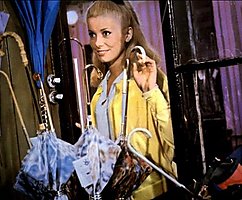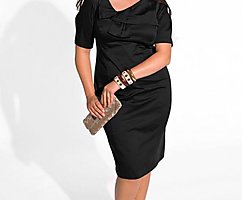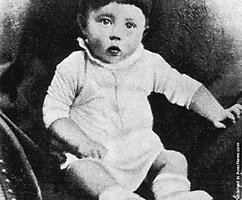How to cheat: Tricks of the baby food industry
 Bashny.Net
Bashny.Net
Twenty eight million three hundred thirty thousand one hundred ninety three
How to cheat?
If you are outraged like me, seeing every day as a mock innocent children, feeding them inappropriate food, then I guess you agree that the promotion of baby food, abusive, should be regarded as a crime. Any person who by ignorance or carelessness contributed to the fact that the baby was fed inappropriate milk, may be guilty in infant death. – Dr. Cicely Williams, Milk and offense, 1939
Multi-million dollar industry of baby food to two million dollars a day – all care about money and not about health. The essential value of breastfeeding is undermined, despite the exceptional benefits for both mother and child. Despite the fact that scientific studies continue to confirm the superiority of breast milk, feeding mixtures is becoming the norm. Aggressive marketing policy of manufacturers of mixtures introduces the mothers in confusion, forcing them to believe that formula and breast milk are equal. The breast has taken the children and proclaimed only a sex object. The positive impact of breastfeeding on women's health is also ignored. Around the world people spend money to buy mixes instead of spending it on more useful things.
Companies manufacturing food for children have an impact on government policy. They use "science" to scare mothers, exploit women's labor law and the desire of men to meet their family's needs. Yeah, they stopped advertising in the media, but they bought time and programs to undermine the value of breastfeeding. They clean children's faces with bottles of mixtures, but instead put them on "follow-up" mixture. They complained has adopted the international code of marketing of breast-milk substitutes, and still complain that it is too limiting. Through the Organization of world trade they accumulate even more power. Despite the Code, despite the efforts of thousands of lawyers protecting breastfeeding, infant formula market is thriving, the number of manufacturers of mixtures increases, their profits increase.
All about profit
The main goal of corporations is to increase profits by expanding markets, invention of new products and increasing sales. Their greed is limitless and more and more babies suck rubber pacifier in a vain attempt to find breast milk. Their main interest is profit, not health. It is quite clear that breastfeeding is not beneficial for producers of blends. Industry of baby food (which includes the production of bottles and teats) is an industry with an income of about 8 trillion dollars a year with huge profit and fierce competition. Of every dollar of income, only 16 cents go to development and research.
Corporations make investments only in order to increase their profits. Manufacturers of mixtures allocate funds to doctors, nurses, students of medical institutions, departments of Pediatrics for research, equipment, gifts, payments, conferences, travel and publications to their products recognized and promoted.
The fact that huge funds are spent on the promotion and protection of the interests means that the smaller part is spent on quality control, research and core components. The who (world health organization) recommended that dokozagexaenova acid (DHA), an essential component necessary for the development of the brain, was added to infant formula. In Europe and Asia it was made, but the United States turned against. Management under the control over products and medicines (FDA), and Ross Pharmaceuticals (the manufacturer of "Similae") stated that no sufficient scientific basis for this, but Ross just admitted that it's too expensive. Ross from income support Programs for mothers, children and infants fell because of discounts, thus, the reason for refusal was loss of profit. Less likely, it seems, thinking about children's health. Manufacturers care more about costs than about morality, so they don't leave the market, especially in the present time when a growing number of firms that sell baby food, mixtures for pregnant women (at least a dozen of such mixtures is already sold), bottles and nipples.
Most of the components of infant formula incredibly cheap. The cost of powdered milk is only one-sixth of the total cost. Soy protein isolate in the soy mixture even cheaper.
On the other side of the stage
As distribution of infant formula, corporations-manufacturers are becoming more creative influence on the government, challenging laws that attract clinics and hospitals as a sales agents. When the effectiveness of the means of promotion is declining, companies seek support from the government.
The basis of breast-milk substitutes included cow's milk or processed soy protein. Despite this, manufacturers of mixtures were able to convince the FDA to recognize the mixture of food, not a medicine, therefore, mixtures are subject to less stringent control. FDA approved the use of soy protein isolate in soy formula even though it has no generally Accepted security status.
Corporations influence the selection of delegates to international meetings devoted to the issues of children's nutrition, including those sponsored by the who. They offer special terms for the purchase of breast-milk substitutes programmes on nutrition for children, women and even orphans, but require to use their logo. Use every opportunity to advertise their products.
For the government the import of baby food cost effective. Government revenues through tax payments and import duties. For example, in Zimbabwe, the government's income is 17.5% of tax payments and 10% of import duties. Thus, the government receives income when mothers feed their babies with breast.
Manufacturers of mixtures which have special links with various government departments in the sectors of child nutrition and child health. They have their own lawyers who clearly follow their interests. The company paid delegates attending the international conference on nutrition, so they vote for them.
Manufacturers of mixtures and their agents even have an effect on the development of materials to protect breastfeeding. One of the known cases: Nestle sent a letter to the Secretary of the Ministry of health in the United States, calling to ban the new publication "Perspectives of breastfeeding for mother and child", which enjoyed great popularity because they feared its influence. The publication of "unscientific" — they are accused. However, their attempts have not crowned success. In Zimbabwe, efforts of Nestle became impossible the publication of the article "Nurse child", sponsored by UNICEF. It is hard to imagine how many more of these articles was not published.
When the support group of breastfeeding in Guatemala protested against for children to baby food Gerber, recently tried to solve the case of bribes in the national Committee on breastfeeding. When that failed, they began to threaten the government. If the government refuses Gerber in his rights, they will develop the business outside of the country. Unfortunately, Gerber has made his own.
Support group breastfeeding constantly under attack from manufacturers of mixtures, as they constantly demand that their representatives participated in various conferences and projects. These representatives are working to mitigate any recommendations that would lead to a decrease in sales. In Australia the Federal Bureau of consumers and few producers have an agreement, therefore, complaints concerning infant formulas consider representatives of companies producing them! In the Philippines, the national Code restricts the diffusion of compounds, but the government does not punish companies that violate this provision.
AIDS and breastfeeding
One of the most egregious examples of how advertised of the mixture is about the fact that mothers with acquired immunodeficiency syndrome (AIDS) should not be fed. Despite the absolute unscientific statements that AIDS is transmitted through breast milk, corporations saw the opportunity for the epidemic spread of mixes in third world countries. For producers of mixtures AIDS is a great opportunity that they use. In South Africa, the head of the Ministry of health issued a statement on the forum of the Women's International League in 1998 – "We're in bed with the enemy."
Manufacturers of mixtures were used for the study on AIDS, presented at the international meeting in Vancouver in 1996, demanded on the first page of the New York Times to the UNICEF approved the use of the compounds for HIV-infected mothers. The industry made this decision despite the fact that the article was published in a scientific journal. The article interviewed six "experts" on breastfeeding, but have not written anything about their opinions. He has, however, published opinions of attorneys, such as Ted Jackson, who is not related to breastfeeding. Ted Jackson – immunologist, an employee of Nestle. The article was very one-sided and caused a protest from the who and UNICEF, so as to jeopardize the interests of children in third world countries.
Recent studies show that HIV - positive mothers successfully feed infants exclusively breastfed for six months, but no one announces it. It is clear that mixed feeding in case of this problem would be the worst option.
Interference and influence
You can cite many examples of active interference and influence of baby food manufacturers. In Geneva, at a national meeting on nutrition were manufacturers of mixtures. Recommendations even kept secret and announced only at the plenary session.
At the Congress in defense of motherhood, under the leadership of the International labor organization in 1952 established a 12-week maternity leave, payment of two thirds of average earnings and daily work break to feed for one hour. In 1999, at a meeting in Geneva of powerful corporations advocated the abolition of the paragraph on feeding. New Zealand, Australia, United Kingdom, United States and some other countries took their side, but Italy, Greece, Austria, Croatia, Netherlands, Philippines, United Arab Emirates, Latin America, Africa and others opposed. According to the vote of the break for feeding preserved. However, disagreements remained. In most countries, women feed, but breaks in the Convention on the protection of motherhood, make more difficult the organization of breastfeeding in the workplace, depriving mothers who want to feed them right.
The last trick Nestle to gain the approval of the government was the claim that their work is constructed in accordance with the Code. Nestle proposes that representatives of the government signed the "Certificate of conformity to the Code." This has already happened in Panama, where Nestle has influenced the government to obtain the signature.
The South African government is also under pressure, but thanks to IBFAN, this policy turned against Nestle, as an increasing number of members of the government – opponents of Nestle. The Ministry of health in South Africa, invited Nestle to change labels on some products, because these products are recommended from 4-6 months (and not 6 according to the who). There were also complaints that the Nestle posters and brochures with the incorrect information has been widely posted in the clinics.
"Mixture — fiction", Australian film, shot by Ibfem for use in the training programme in South Africa. The need for this film came from a long inactivity of the nutrition division of the Ministry of health. But was instructed not to show the film to the working group on breastfeeding, because Nestle was afraid that their image will be threatened, while they were negotiating with the Ministry of Health.
Manufacturers of mixtures continue to criticize the Code, but the effort is unsuccessful. However, they provide information to government and medical experts to refute the violations of the Code.
Retail stores
Manufacturers of blends are buying space in stores and are flooding them with your products, posters and other promotional materials. In the Philippines, for example, supermarkets were filled with baby food and materials, forcing mothers to feel the satisfaction of buying brand goods. You can even bring in an example of a poster with the information that from the use dilution of the mixture of contaminated water may be a disorder of the intestine. Next sold bottled water. But still antibacterial effect (as when feeding breast milk) it is impossible to achieve. Soy mixture is sold for children who are allergic to dairy. As always, the risk of using such products is downplayed. In the United States on the shelves of baby food is the inscription "recommended government program support the health of women, children and the baby." For the promotion of goods used government program.
About medical workers
Hospitals, clinics, antenatal clinics and physicians ' offices have become centers – distributors. Sales representatives enter the chamber, clinics with their products, telling them the wrong information. In a hospital in East London that supports mainly Africans, nurses reported that Similac is not a mixture, and additional nutrition for the preterm. Mothers are also convinced that to feed their premature babies with a mixture better than breast. In South Africa, Nestle paid for training courses for nurses. They also founded the Department of nutrition at the Institute of Cape town. In the offices of doctors distributed free bottles of mixtures and informational materials. Even movies about breastfeeding seem taken by companies for the production of mixes!
Statistics show that 93 percent of mothers who received free samples of the mixtures, and then use this brand. The U.S. government is sponsoring programs for food, which relate to the distribution compounds. So mothers are tied to a certain brand. (Program participants receive a one-time amount of formula to feed the baby. If this amount is not enough, the mother needs to buy. If the mother fed the baby, it would totally free). Huge sums are paid to hospitals to spread the products of a particular company. Distributors are not allowed in the chamber, but he come in the room for feeding. In South Africa, Abbott used a mixture of Formance for pregnant women, falsely claiming that this product helps the child to grow healthy and increases the amount of milk, although this practice is prohibited by the Code. However, these products are advertised.
Health workers
Health workers are responsible for the success or failure of the Code. They're the manufacturers of mixtures carry out the promotion commodities, encouraging use of their products. Health workers themselves often do not understand that they are used. Industry of baby food in need of health workers to spread their products.
In Pakistan, the representatives of the plant's special dossier on physicians, including information on birthday, family and practice and this information is passed to each other. Doctors with extensive practices are under greater scrutiny.
Representatives of the manufacturers to attend the conference on medical issues, nutrition, breastfeeding and also sponsor them. It should be noted that no meeting is held without the participation of doctors, employees of firms, because the purpose of the meetings is the scientific justification for their point of view. Recently, at a meeting on issues of the Code in Cape town ten official representatives of the companies denied the provisions of the Code and caused confusion. At the meeting the project was led by lawyers who receive gifts and money from the company Nestle. Manufacturers of mixtures even have the audacity to teach breastfeeding when advertising their products discreetly and make women and children depend on their products.
Advisor baby formula produces publications for training health workers. One of them is served in the form of discussions and outcome is the belief that the mix is as good as breast milk. When an international monitoring group has published a refutation of the "Violation Code", Nestle has released a supporting document "Missed opportunity" and distributed it to doctors and health workers. Scientific substantiation of the lack of nutrients in breast milk also spread, but no one's talking about how to improve the diet of the mother. Only fear-mongering to sell a mixture.
The company does not allocate money for nothing. The American Association of Pediatrics (AAP) annually receives $ 1 million from manufacturers and 8 million is funded for construction. (AARP has not received a grant of $ 8 million due to objections to sell soy mixture). Companies pay for conferences, special offers, product exhibition, research, publication, training and annual scholarships. Some groups are protesting. For example, the Indian Association of pediatricians does not want to "milk" money from companies.
Media
In the media represent women as sex objects. Lactating women seem unthinkable in robes-vests, with big Breasts like some cow. Men are bottle-fed. All this should be regarded by women as a violation of their rights and that they should fix.
There is no doubt that corporations have ties with the media and use them to your advantage. Nestle bought time for a television showing of a child who died from what was received the wrong breast milk and did not receive the mixture. Abbott did the same with the message about infant death due to inadequate medical supervision. The child was breastfed. The company effectively used the publication of the Wall Street Journal, Time and the New York Times, but almost never publishes information about the negative impact of mix.
The Internet has become a powerful tool for promotion, and the company very cleverly use it. It is sometimes difficult to understand what is advertising mix. For example, the article "bottle Feeding without feeling guilty" "parents ' Choice", "Bottle baby", "pink-Cheeked robust fellow". Companies organize training courses for parents on nutrition and focus on proper nutrition. They solve a problem or act in their own interests?
Consumers
However strong it would seem of the Corporation, they can be made to act in the interests of society, to meet the needs of people, not to harm and to take care of a better future for children.
We must respond with action to protect the health of the public and to end the practice of feeding defective products, which interfere with breastfeeding and only focused on profits for corporations. We need to build a system that would protect the health of the mother and child. We need to value mothers and to ensure their maternal rights. Society must recognize the value of motherhood and provide support. BUT above ALL, mothers themselves should recognize the critical importance of their ability to breastfeed and to defend their rights.
Naomi Baumslag, doctor of medicine, Professor of Pediatrics at the medical school of the University of Georgetown, President of the international Women's health groups, Bethesta, MD
Source: vk.com/clubnnr?z=photo-217795_352308360%2Falbum-217795_00%2Frev
How to cheat?
If you are outraged like me, seeing every day as a mock innocent children, feeding them inappropriate food, then I guess you agree that the promotion of baby food, abusive, should be regarded as a crime. Any person who by ignorance or carelessness contributed to the fact that the baby was fed inappropriate milk, may be guilty in infant death. – Dr. Cicely Williams, Milk and offense, 1939
Multi-million dollar industry of baby food to two million dollars a day – all care about money and not about health. The essential value of breastfeeding is undermined, despite the exceptional benefits for both mother and child. Despite the fact that scientific studies continue to confirm the superiority of breast milk, feeding mixtures is becoming the norm. Aggressive marketing policy of manufacturers of mixtures introduces the mothers in confusion, forcing them to believe that formula and breast milk are equal. The breast has taken the children and proclaimed only a sex object. The positive impact of breastfeeding on women's health is also ignored. Around the world people spend money to buy mixes instead of spending it on more useful things.
Companies manufacturing food for children have an impact on government policy. They use "science" to scare mothers, exploit women's labor law and the desire of men to meet their family's needs. Yeah, they stopped advertising in the media, but they bought time and programs to undermine the value of breastfeeding. They clean children's faces with bottles of mixtures, but instead put them on "follow-up" mixture. They complained has adopted the international code of marketing of breast-milk substitutes, and still complain that it is too limiting. Through the Organization of world trade they accumulate even more power. Despite the Code, despite the efforts of thousands of lawyers protecting breastfeeding, infant formula market is thriving, the number of manufacturers of mixtures increases, their profits increase.
All about profit
The main goal of corporations is to increase profits by expanding markets, invention of new products and increasing sales. Their greed is limitless and more and more babies suck rubber pacifier in a vain attempt to find breast milk. Their main interest is profit, not health. It is quite clear that breastfeeding is not beneficial for producers of blends. Industry of baby food (which includes the production of bottles and teats) is an industry with an income of about 8 trillion dollars a year with huge profit and fierce competition. Of every dollar of income, only 16 cents go to development and research.
Corporations make investments only in order to increase their profits. Manufacturers of mixtures allocate funds to doctors, nurses, students of medical institutions, departments of Pediatrics for research, equipment, gifts, payments, conferences, travel and publications to their products recognized and promoted.
The fact that huge funds are spent on the promotion and protection of the interests means that the smaller part is spent on quality control, research and core components. The who (world health organization) recommended that dokozagexaenova acid (DHA), an essential component necessary for the development of the brain, was added to infant formula. In Europe and Asia it was made, but the United States turned against. Management under the control over products and medicines (FDA), and Ross Pharmaceuticals (the manufacturer of "Similae") stated that no sufficient scientific basis for this, but Ross just admitted that it's too expensive. Ross from income support Programs for mothers, children and infants fell because of discounts, thus, the reason for refusal was loss of profit. Less likely, it seems, thinking about children's health. Manufacturers care more about costs than about morality, so they don't leave the market, especially in the present time when a growing number of firms that sell baby food, mixtures for pregnant women (at least a dozen of such mixtures is already sold), bottles and nipples.
Most of the components of infant formula incredibly cheap. The cost of powdered milk is only one-sixth of the total cost. Soy protein isolate in the soy mixture even cheaper.
On the other side of the stage
As distribution of infant formula, corporations-manufacturers are becoming more creative influence on the government, challenging laws that attract clinics and hospitals as a sales agents. When the effectiveness of the means of promotion is declining, companies seek support from the government.
The basis of breast-milk substitutes included cow's milk or processed soy protein. Despite this, manufacturers of mixtures were able to convince the FDA to recognize the mixture of food, not a medicine, therefore, mixtures are subject to less stringent control. FDA approved the use of soy protein isolate in soy formula even though it has no generally Accepted security status.
Corporations influence the selection of delegates to international meetings devoted to the issues of children's nutrition, including those sponsored by the who. They offer special terms for the purchase of breast-milk substitutes programmes on nutrition for children, women and even orphans, but require to use their logo. Use every opportunity to advertise their products.
For the government the import of baby food cost effective. Government revenues through tax payments and import duties. For example, in Zimbabwe, the government's income is 17.5% of tax payments and 10% of import duties. Thus, the government receives income when mothers feed their babies with breast.
Manufacturers of mixtures which have special links with various government departments in the sectors of child nutrition and child health. They have their own lawyers who clearly follow their interests. The company paid delegates attending the international conference on nutrition, so they vote for them.
Manufacturers of mixtures and their agents even have an effect on the development of materials to protect breastfeeding. One of the known cases: Nestle sent a letter to the Secretary of the Ministry of health in the United States, calling to ban the new publication "Perspectives of breastfeeding for mother and child", which enjoyed great popularity because they feared its influence. The publication of "unscientific" — they are accused. However, their attempts have not crowned success. In Zimbabwe, efforts of Nestle became impossible the publication of the article "Nurse child", sponsored by UNICEF. It is hard to imagine how many more of these articles was not published.
When the support group of breastfeeding in Guatemala protested against for children to baby food Gerber, recently tried to solve the case of bribes in the national Committee on breastfeeding. When that failed, they began to threaten the government. If the government refuses Gerber in his rights, they will develop the business outside of the country. Unfortunately, Gerber has made his own.
Support group breastfeeding constantly under attack from manufacturers of mixtures, as they constantly demand that their representatives participated in various conferences and projects. These representatives are working to mitigate any recommendations that would lead to a decrease in sales. In Australia the Federal Bureau of consumers and few producers have an agreement, therefore, complaints concerning infant formulas consider representatives of companies producing them! In the Philippines, the national Code restricts the diffusion of compounds, but the government does not punish companies that violate this provision.
AIDS and breastfeeding
One of the most egregious examples of how advertised of the mixture is about the fact that mothers with acquired immunodeficiency syndrome (AIDS) should not be fed. Despite the absolute unscientific statements that AIDS is transmitted through breast milk, corporations saw the opportunity for the epidemic spread of mixes in third world countries. For producers of mixtures AIDS is a great opportunity that they use. In South Africa, the head of the Ministry of health issued a statement on the forum of the Women's International League in 1998 – "We're in bed with the enemy."
Manufacturers of mixtures were used for the study on AIDS, presented at the international meeting in Vancouver in 1996, demanded on the first page of the New York Times to the UNICEF approved the use of the compounds for HIV-infected mothers. The industry made this decision despite the fact that the article was published in a scientific journal. The article interviewed six "experts" on breastfeeding, but have not written anything about their opinions. He has, however, published opinions of attorneys, such as Ted Jackson, who is not related to breastfeeding. Ted Jackson – immunologist, an employee of Nestle. The article was very one-sided and caused a protest from the who and UNICEF, so as to jeopardize the interests of children in third world countries.
Recent studies show that HIV - positive mothers successfully feed infants exclusively breastfed for six months, but no one announces it. It is clear that mixed feeding in case of this problem would be the worst option.
Interference and influence
You can cite many examples of active interference and influence of baby food manufacturers. In Geneva, at a national meeting on nutrition were manufacturers of mixtures. Recommendations even kept secret and announced only at the plenary session.
At the Congress in defense of motherhood, under the leadership of the International labor organization in 1952 established a 12-week maternity leave, payment of two thirds of average earnings and daily work break to feed for one hour. In 1999, at a meeting in Geneva of powerful corporations advocated the abolition of the paragraph on feeding. New Zealand, Australia, United Kingdom, United States and some other countries took their side, but Italy, Greece, Austria, Croatia, Netherlands, Philippines, United Arab Emirates, Latin America, Africa and others opposed. According to the vote of the break for feeding preserved. However, disagreements remained. In most countries, women feed, but breaks in the Convention on the protection of motherhood, make more difficult the organization of breastfeeding in the workplace, depriving mothers who want to feed them right.
The last trick Nestle to gain the approval of the government was the claim that their work is constructed in accordance with the Code. Nestle proposes that representatives of the government signed the "Certificate of conformity to the Code." This has already happened in Panama, where Nestle has influenced the government to obtain the signature.
The South African government is also under pressure, but thanks to IBFAN, this policy turned against Nestle, as an increasing number of members of the government – opponents of Nestle. The Ministry of health in South Africa, invited Nestle to change labels on some products, because these products are recommended from 4-6 months (and not 6 according to the who). There were also complaints that the Nestle posters and brochures with the incorrect information has been widely posted in the clinics.
"Mixture — fiction", Australian film, shot by Ibfem for use in the training programme in South Africa. The need for this film came from a long inactivity of the nutrition division of the Ministry of health. But was instructed not to show the film to the working group on breastfeeding, because Nestle was afraid that their image will be threatened, while they were negotiating with the Ministry of Health.
Manufacturers of mixtures continue to criticize the Code, but the effort is unsuccessful. However, they provide information to government and medical experts to refute the violations of the Code.
Retail stores
Manufacturers of blends are buying space in stores and are flooding them with your products, posters and other promotional materials. In the Philippines, for example, supermarkets were filled with baby food and materials, forcing mothers to feel the satisfaction of buying brand goods. You can even bring in an example of a poster with the information that from the use dilution of the mixture of contaminated water may be a disorder of the intestine. Next sold bottled water. But still antibacterial effect (as when feeding breast milk) it is impossible to achieve. Soy mixture is sold for children who are allergic to dairy. As always, the risk of using such products is downplayed. In the United States on the shelves of baby food is the inscription "recommended government program support the health of women, children and the baby." For the promotion of goods used government program.
About medical workers
Hospitals, clinics, antenatal clinics and physicians ' offices have become centers – distributors. Sales representatives enter the chamber, clinics with their products, telling them the wrong information. In a hospital in East London that supports mainly Africans, nurses reported that Similac is not a mixture, and additional nutrition for the preterm. Mothers are also convinced that to feed their premature babies with a mixture better than breast. In South Africa, Nestle paid for training courses for nurses. They also founded the Department of nutrition at the Institute of Cape town. In the offices of doctors distributed free bottles of mixtures and informational materials. Even movies about breastfeeding seem taken by companies for the production of mixes!
Statistics show that 93 percent of mothers who received free samples of the mixtures, and then use this brand. The U.S. government is sponsoring programs for food, which relate to the distribution compounds. So mothers are tied to a certain brand. (Program participants receive a one-time amount of formula to feed the baby. If this amount is not enough, the mother needs to buy. If the mother fed the baby, it would totally free). Huge sums are paid to hospitals to spread the products of a particular company. Distributors are not allowed in the chamber, but he come in the room for feeding. In South Africa, Abbott used a mixture of Formance for pregnant women, falsely claiming that this product helps the child to grow healthy and increases the amount of milk, although this practice is prohibited by the Code. However, these products are advertised.
Health workers
Health workers are responsible for the success or failure of the Code. They're the manufacturers of mixtures carry out the promotion commodities, encouraging use of their products. Health workers themselves often do not understand that they are used. Industry of baby food in need of health workers to spread their products.
In Pakistan, the representatives of the plant's special dossier on physicians, including information on birthday, family and practice and this information is passed to each other. Doctors with extensive practices are under greater scrutiny.
Representatives of the manufacturers to attend the conference on medical issues, nutrition, breastfeeding and also sponsor them. It should be noted that no meeting is held without the participation of doctors, employees of firms, because the purpose of the meetings is the scientific justification for their point of view. Recently, at a meeting on issues of the Code in Cape town ten official representatives of the companies denied the provisions of the Code and caused confusion. At the meeting the project was led by lawyers who receive gifts and money from the company Nestle. Manufacturers of mixtures even have the audacity to teach breastfeeding when advertising their products discreetly and make women and children depend on their products.
Advisor baby formula produces publications for training health workers. One of them is served in the form of discussions and outcome is the belief that the mix is as good as breast milk. When an international monitoring group has published a refutation of the "Violation Code", Nestle has released a supporting document "Missed opportunity" and distributed it to doctors and health workers. Scientific substantiation of the lack of nutrients in breast milk also spread, but no one's talking about how to improve the diet of the mother. Only fear-mongering to sell a mixture.
The company does not allocate money for nothing. The American Association of Pediatrics (AAP) annually receives $ 1 million from manufacturers and 8 million is funded for construction. (AARP has not received a grant of $ 8 million due to objections to sell soy mixture). Companies pay for conferences, special offers, product exhibition, research, publication, training and annual scholarships. Some groups are protesting. For example, the Indian Association of pediatricians does not want to "milk" money from companies.
Media
In the media represent women as sex objects. Lactating women seem unthinkable in robes-vests, with big Breasts like some cow. Men are bottle-fed. All this should be regarded by women as a violation of their rights and that they should fix.
There is no doubt that corporations have ties with the media and use them to your advantage. Nestle bought time for a television showing of a child who died from what was received the wrong breast milk and did not receive the mixture. Abbott did the same with the message about infant death due to inadequate medical supervision. The child was breastfed. The company effectively used the publication of the Wall Street Journal, Time and the New York Times, but almost never publishes information about the negative impact of mix.
The Internet has become a powerful tool for promotion, and the company very cleverly use it. It is sometimes difficult to understand what is advertising mix. For example, the article "bottle Feeding without feeling guilty" "parents ' Choice", "Bottle baby", "pink-Cheeked robust fellow". Companies organize training courses for parents on nutrition and focus on proper nutrition. They solve a problem or act in their own interests?
Consumers
However strong it would seem of the Corporation, they can be made to act in the interests of society, to meet the needs of people, not to harm and to take care of a better future for children.
We must respond with action to protect the health of the public and to end the practice of feeding defective products, which interfere with breastfeeding and only focused on profits for corporations. We need to build a system that would protect the health of the mother and child. We need to value mothers and to ensure their maternal rights. Society must recognize the value of motherhood and provide support. BUT above ALL, mothers themselves should recognize the critical importance of their ability to breastfeed and to defend their rights.
Naomi Baumslag, doctor of medicine, Professor of Pediatrics at the medical school of the University of Georgetown, President of the international Women's health groups, Bethesta, MD
Source: vk.com/clubnnr?z=photo-217795_352308360%2Falbum-217795_00%2Frev
Tags
See also
Don't be manipulated! How we deceive daily
How to cheat gynecologists
How we cheat well-known manufacturers of electronics
Dangerous products
How we cheat banks 20.02.2013
Expectations vs. Reality. How we cheat hotels
As we deceive business: revelation workers
Cheating banks.
How deceiving us in pharmacies
How to cheat revelations of employees of American companies

















